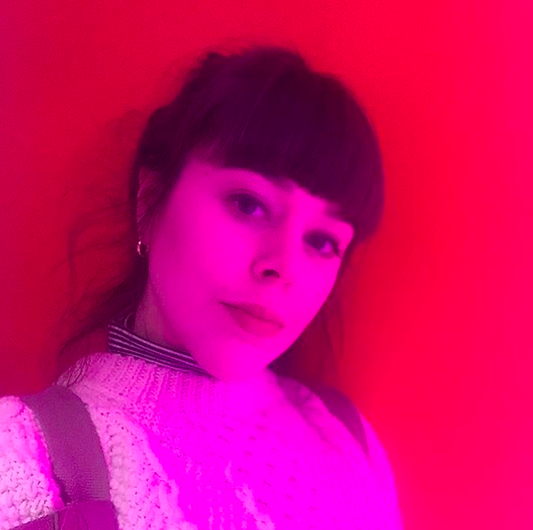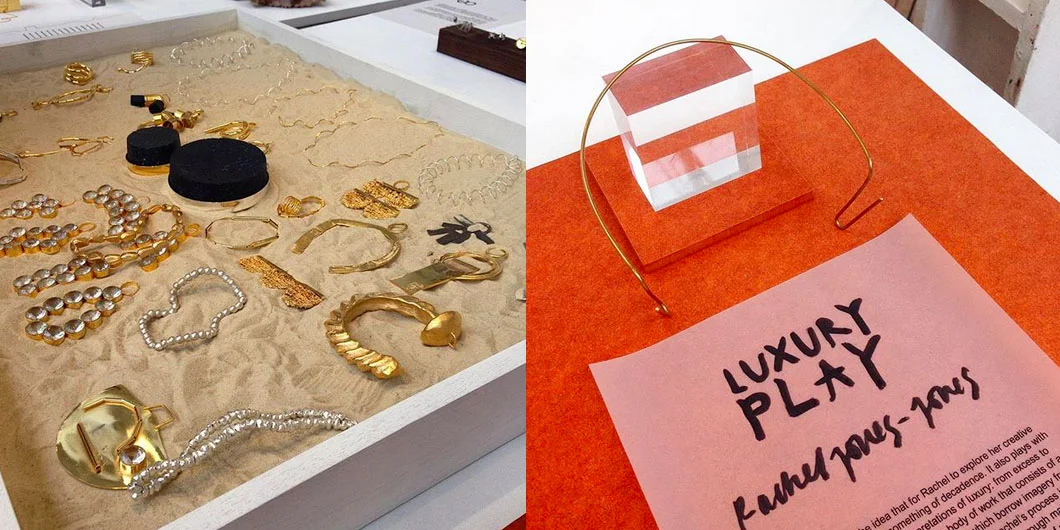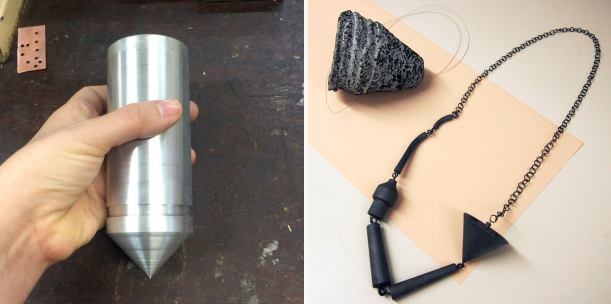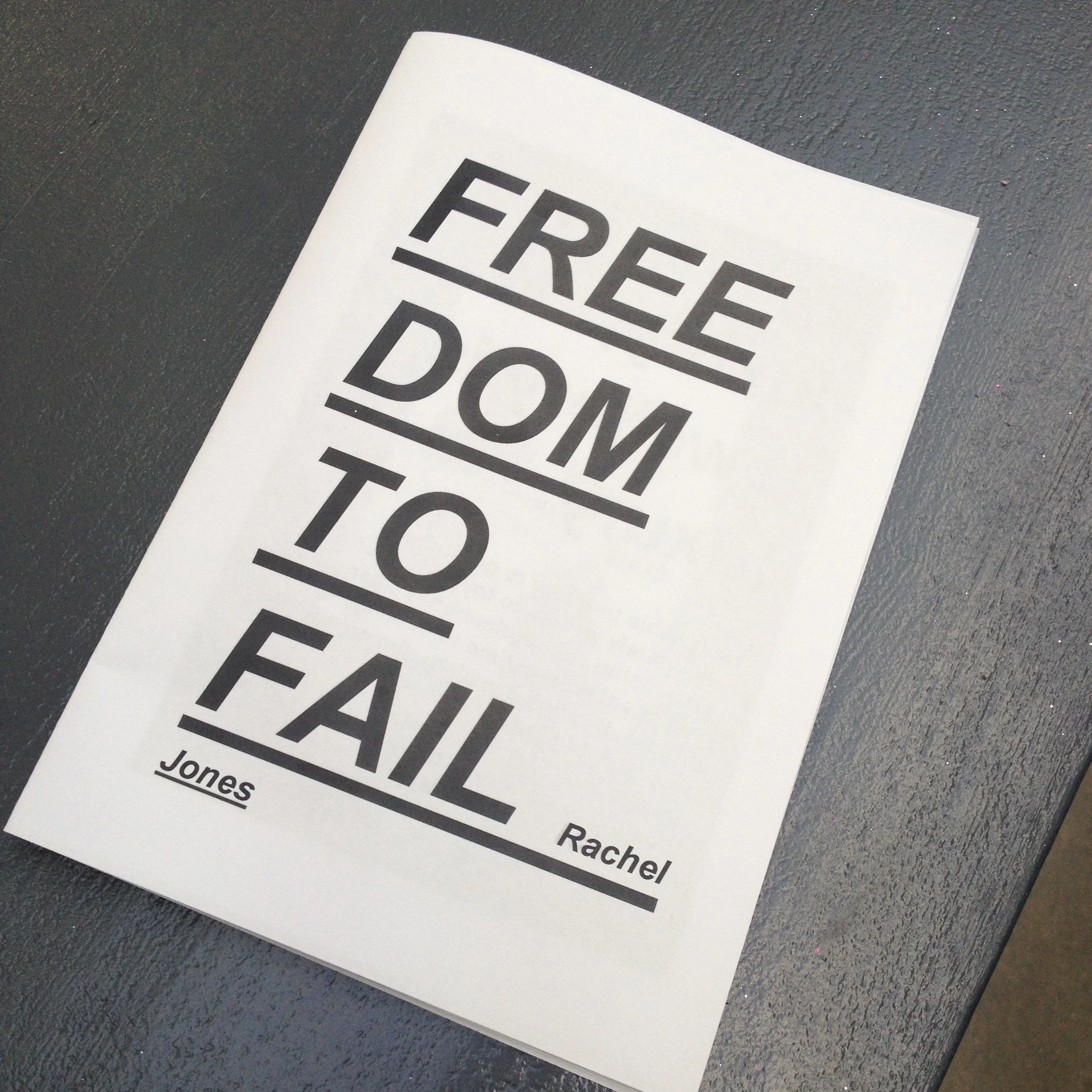Conversations with Makers is a new series on the blog.
As part of my work I regularly meet makers to discuss their creative practices and I always find the conversations insightful and inspiring. I thought maybe you would too. The act of articulating your work, to another person, regularly, is something we often overlook but which is vital if we are to remain critically engaged with what we do. Discussing your work, but also hearing other people talk about their work, helps the thinking behind the making no end.
So, once a month, I will share a conversation I have had with a maker. Next up – Rachel Jones-Jones.
I first met Rachel at the 3rd year work in progress show and was immediately taken by her project on failure and risk taking. I invited her to be part of the Makers & Tools project last year, and was thrilled by her engagement with the concept despite the demands of finishing her final year collection. Since then we’ve shared some excellent disucssions about the nature of making and our creative practices. In this conversation I caught up with her during her first term as Artist in Residence and we discussed what it’s like taking those first steps post-graduation, what it means if you’re not making and coping with failure.
MV Where is your practice now that you’ve graduated? What’s happening and where do you see it going?
I think thematically, what is a running string through all I do is processing a problem, not even a problem, an existing observation in my wider life, and then trying to make sense of that through my practice – for example with the failure and the fear thing last year.
What I’m doing at the moment, I’m collecting objects and then casting them. There is a corned beef key, an engagement ring blank, Haagen Dazs mini scoop, a ring pull from a tin or sardines – anything that can open a trolley instead of a pound coin. I’m casting them all in the same material, so that there is a relationship between them that way, and also in their second function, but other than that they’re all completely different things. I think it’s thematically about being able to adapt. With the situation post-graduation everything changes, and then finding multi-purposes in things you already have, functions you already knew you could do but putting them in a new context… for example things you can use instead of a pound coin.
Is it a matter of adapting and survival techniques when you find yourself a bit adrift?
On a creative level, on a conceptual level and on a personal level, yeah.
So even though it feels like things have been quite distinct – when I met you last year you were working with failure, but that was through material processes and methods – and your final degree show was…
…it was a bit more to do with play…
…yes, and it was also challenging notions of luxury through manufacture and hand made. And now it’s taking this wider idea of a situation you find yourself in. But are you still employing elements of the play or the failure or the different approaches to using materials?
I guess the play element for me is when I go to Lidl carpark and try out all these things! (laughs)
Lidl carpark is your centre of activity? Your laboratory?
Yes! I’ll go there at night! I take all these bits of plastic, all these things I’ve found and take them there and see if they open the trolley! So that’s where the play comes in. And in observation, in noticing objects that might be the right dimensions and then just trying it. Maybe I should keep all the things I tried that didn’t work
Maybe!
Thinking ‘why didn’t that work’ comparing things to each other, looking at the depth, the width, the materiality thinking ‘that should have worked’. Maybe it’s a good idea to start keeping it all, creating a collection.
I’d like to do some other projects as part of my residency, but this is the one that runs through it, kind of a passive project as there’s not a lot of making involved. It’s always on the backburner.
Like when we were doing Makers & Tools and it existed alongside your work and you could pick it up in opposition to what you were doing…
Yeah, this is my Makers & Tools now.
So it’s fulfilling that role of something else to do and something you’re always thinking of but not necessarily actively engaged with
I’ll go and make moulds and stuff, but apart from that it’s mainly a scavenging activity. Finding rubbish and reinterpreting. I like this idea of improvised weapons or alternative currency. Two things – the dual use.
So, how is this an improvised weapon?
I read that term at some point, and it was nothing to do with this project, but I kept thinking about it. It’s a military term, isn’t it?
I don’t know, I’ve never heard it before. And when you said it I thought it sounded a bit antagonistic, which seems a bit at odds with you, but also seems a bit at odds with what you’re trying to do – where you could have something on your person that would do that job (open the trolley) without needing the right thing.
Maybe something that isn’t designed for a job is as good as something that is. Or when something is designed, like a corned beef key, that’s got one function but it’s good for opening fuse boxes and loads of things. It’s that ability to see the multi-purpose. I’m trying not to over conceptualise it, because it started off as a fun thing, the feeling of putting something into a trolley and going ‘yes!’ when it opens.
On a practical level, do things get stuck in there and you can’t get them out?
Yeah, but usually you fix it by getting the other trolley and putting it back. Sometimes I do think that I’m going to break the object, like the engagement blank, and I really didn’t want to lose that.
You talk about this as being project that lies alongside things. What is it lying alongside if it’s not the main work?
Hmm. At the moment it is the main work. It’s a time thing and the balance that I’ve yet to completely master. Before I graduated I wanted to keep money and my practice very separate but I didn’t realise how much trial and error that would take. And it’s not that this job [working in a café] is the worst job in the world, but it does take up a lot of time. And when you’re getting paid £8 an hour, you have to do quite a lot and it’s a big trade. It’s balancing. So with this project there’s always something keeping me in touch…
It’s functioning not as a project that keeps your mind occupied so much as being the link to your making practice?
Exactly. And even when I’m in the café there will be things kicking around and I’ll think ‘maybe that will work’. It’s a very portable project, which means I don’t have to be in the workshop all the time.
A bit like me with looking at stuff on the ground: I can do that anywhere and stuff pops up at weird times. It’s always ticking along.
Completely.
I feel like I’m resisting being sucked into the craft world, which is where a lot of advice is telling me to go, but I know in myself that’s not where I envisioned my practice going. I’m doing a collaboration with a textile designer, making jewellery pieces for her collection, and it’s enjoyable but it’s not really what I see my future being. A woman I know is opening a homeware store and florist and she’s asked me to make some earrings, and yes, I’d be using my skill doing something that I would probably like doing, but in the bigger picture it’s not what engages me. It’s not that I dislike making pretty things but I don’t get that much out of it. I’d much rather make sense of things I’m struggling with inside and outside of my practice through my practice.
Like a more holistic approach? It’s not ‘here is my making practice’ and ‘here is my life’ the two are linked, they feed into each other…
…and they affect each other. If one isn’t going well neither is the other (thinks) I’m not sure it’s so wise to be so involved (laughs) maybe it’s dangerous to put too much of your view of yourself inside your work. But, the sort of work I respond to is the kind of work that makes me smirk or is slightly cynical. It’s a ‘me too’ thing where I relate to it, even if it’s quite abstract.
How is it working for you, then on a practical level, this residency? For a lot of makers, whether they’re doing a residency or working, getting into a routine and finding the balance between the things you have to do to earn money and being in the studio is a constant battle. Is the residency part of that trial and error for you, figuring those things out, not just being a time to make work?
Yes, completely. I feel like I have to be several different people. I have to do tutorials on a Monday, which I love doing. But I have that imposter syndrome because I’m giving all this advice and I haven’t made anything recently. I guess it’s fulfilling to be able to recycle and make use of the things I’ve learnt, also it’s odd because I’m aware that when I give advice I probably wouldn’t be able to see those things if it was my own project, objectively. The change of perspective is really refreshing, and ultimately it will help my practice, but it’s finding the time to let it.
In the past few months, within the city, I’ve made myself a completely new life. And I’m not sure I’ve given myself the credit for that, that maybe I deserve to give myself, because it’s quite a big deal. People who had obligations like Lustre or shows to make things for, they didn’t have time to stop making. But for me, who didn’t have those things, it’s about defining what I want to do, what context I want my work in. So it’s important for me to take some time to think about where I fit, where my work has a place.
Yes, I think about this quite a lot. About makers and artists in the early stages of their careers, really thinking about their audience, who it’s for and why they’re making the work. It can be for you, but it will also be for others.
Yes, I’d like my work to be relevant to other people too…
And a lot of makers get sucked into making work that they know there’s an audience for, and it’s quite a safe and logical thing to do. They take that step quite quickly, but maybe it’s not wrong to pause…
…to work it out.
Yes. Pauses aren’t always a bad thing, but we fear the lulls and the ebbs of things, creatively.
It can be an uncomfortable place to be, like when there’s an awkward pause in conversation.
Yes, and we talk to fill it! We don’t let it be.
I do wonder about the way craft education seems to be set up, that there’s a lot of focus on the final collection or show, and it feels like ‘this is the work’ and for some people it is, and if they genuinely feel that way and they love it, that’s great. But for some people it isn’t, it’s just one project they did in that year, and it could have been different if the circumstances were different.
Completely!
And when you step out of that, if you want to pause, and go ‘is this right?’ having the confidence to stay in that space until you figure it out, without jumping into something, can be really difficult.
I think it’s how to utilise that pause. You don’t always have to have an aim. What I think is most important for me right now is to define what I consider ‘doing well’. Because I did a craft degree and what is considered to be the next step from that, setting up a business, going to fairs to sell my work, isn’t what I want to do. My career isn’t necessarily jewellery. So when I see people around me doing well in that sense, it’s hard for me to break that down and realise ‘that’s not even what you want!’
That’s the killer isn’t it? We look at our peers and forget that we’re not necessarily in the same space as them.
Yes, when you’ve had the same background, the same education, but your plans are different. I think my path is a little bit more abstract and the trajectory could be so long. And when I say that my practice and my life are intertwined, I feel like that will always be the case. It’s a matter of patience and persistence I think. And allowing fear in a healthy way.
Do you think that doing this residency now is a good space for containing this? If you didn’t have the residency with its expectations of places you have to be, things you have to do, you’d be having to figure out these things…
… alone. It’s the reason I did it. I was not in the position in my final year to be planning the next step. And even now I’m struggling, and I don’t have the pressure of a final show. But I needed to give myself this year, and maybe it will take longer, I don’t know. But I need to know that time is there. And I’ve met some people who have made the first decade of their careers from residencies and that appeals to me, but the only way I will get something out of that is if I have… I was going to say, some sort of idea of what my work is about, but I think I have to have an openness to that changing.
And is it about allowing that process to help you narrow things down, or help you navigate towards things?
Yes, I need some structure. I wouldn’t ever describe myself as lazy, but my focus can go broad, to the point where there’s no focus. My head can get filled with all the possibilities. And some doors need to be closed!
By limiting the scope, in certain ways, whether it’s a time period or location, you’re stopping it from being so broad and wide nothing gets done.
Yes, by creating a space for myself. Failure can be tangible or intangible and it’s that tangible failure that I’m trying to avoid. If there’s a space that is defined, where it’s safe for me to make these mistakes, there’s that security. To maintain my failure-driven practice I need that security, otherwise it’s just actual failure. Tangible, real, scary failure!
Although you are engaged in failure in a regular way in your practice, you don’t want total failure. That’s not the exercise, to grind everything to a halt and have it not work at all…
No. What I’m trying to eliminate is the fear. It’s the fear of failure that’s at the centre of my interest in failure. If that’s the worst thing that can happen, I want to make it happen and realise that it’s not. It’s the structure and security that’s important. Something has to be certain in order for everything else to be uncertain, and to survive in that.
That makes sense.
And that’s what I’m trying to do with my ‘rejection collection’ applying for everything and expecting to be rejected. I’m rethinking what rejection means in my own head. It’s risk taking in a positive way. Drawing parallels again between real life and studio life.
It’s something we don’t talk about much as artists, failure and the fear of failing. People put a brave face on things, because it’s a struggle. There are aspects of making and creating art that aren’t easy a lot of the time. We like to focus on the positive things. It’s hard to talk about the fact that maybe we aren’t sure where the work is going or what it’s for.
Or to talk about your practice when you feel like it doesn’t exist!
Yes, ‘do I even have a practice when I’ve spent three years of a degree trying lots of different things!’ It can be tempting to say ‘well, I haven’t got it figured out, so maybe I shouldn’t bother’ because surely it should have made sense by now?
When you are having an ebb in your practice you feel like the only one.
Yes, it looks like everyone else is being productive…
… and doing well, in full flow of their young vibrant careers, when maybe they’re not. Maybe the reason they didn’t post anything on Instagram for months was because they didn’t know what was happening to their practice.
But those months, ultimately, in the grand scheme of things may not be that important. When they’re happening they’re awful, but it’s ok to have time when things aren’t going the way you expect them to.
Something you’ve said before, when you said you didn’t feel like a maker because you weren’t making. But what I thought, and what you said defined you as a maker was how you respond to the world, and where you fit in the world. So whether you made something yesterday or not doesn’t define you. You don’t have to constantly affirm who you are as a person every single day…
…hmm interesting. I agree with you, but I think it feels like we do have to. That the easiest way to prove we are makers is by making things in an expected and understandable way. If I said to most people ‘I’m a maker but I don’t make anything. I’m a maker because of how I view the world’ I think they’d say that doesn’t make any sense…
…that you’re a massive fraud! (laughs)…
…they’d say, what does that mean? Even though I know that means something to me.
I would think that is completely valid. It’s something I recognise in other people and myself.
Yes, I think philosophically you can still be a thing without doing a thing. But we are almost afraid of that. The fear of not doing it…
Just being honest about it. When we’ve talked before we’ve been worried about it sounding morbid, but it doesn’t need to.
Yes, why is it that if you haven’t made anything for weeks, months or years, why are we afraid to talk about it? Are we afraid that it means we no longer exist?
Or that the thing that defines us doesn’t exist anymore and especially if you and your practice are so intertwined, when one stops they both stop. You as a person almost stop.
Yes, I get that.
I don’t think it is a problem not to be making. We feel like it is at the time, and I feel like that all the time I’m not making. What contributes to that is people not acknowledging it. The advice you’re given is how to do your website or sell work. The busy bits I can do, but what about the in-between bits?
We’re taught that we should be busy all the time, that any gap is bad.
Yes. We don’t want the gaps, but what if it’s happened? Accepting that. Is it a failure?
I think there’s the need for people to define their own success and failure. What does a genuine failure mean to you? Is it the inability to ever make work or the inability to have ideas about work? I think for me a true failure would be if I couldn’t think about things. If I saw stuff in the world and didn’t respond to it, had no insight or reaction, didn’t get excited by anything ever again, that would be the failure. It’s not a failure if I don’t pick up a tool and make something, because I’m still thinking about it and engaging with it.
I think it is a skill, to continue when you’re not working, to remain sturdy and confident and self-assured, when the thing that makes you those things isn’t existing.
I think that’s what resilience is. Getting through those tough times. I like the saying ‘this too will pass’. Things will change, you’ll find yourself in a different situation and things resolve themselves. But you’ve got to trust that will happen. You can’t always make that happen, you’ve just got to allow time, and that’s what resilience is. Taking what comes and not letting it derail you.
And that’s why I’m so eager to do this personal rejection project. To just keep applying for things, to see what happens. It’s a development of self in terms of me and my practice, back and forth.
Yes, maintaining the links between the two, developing strength in one area to support the other when it’s not working.
Exactly!
Rachel Jones-Jones is a concept jeweller who graduated in 2017 from BA in Jewellery and Silversmithing at Birmingham City University. She is currently one of the artists on the BCU Artists in Residence programme.
Instagram @doppeljones



